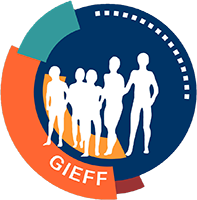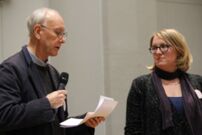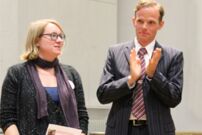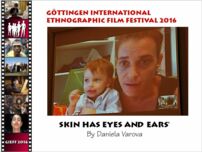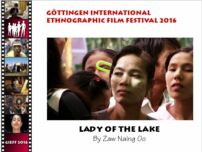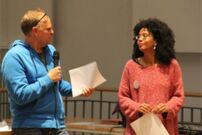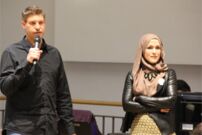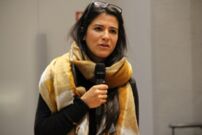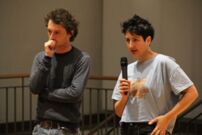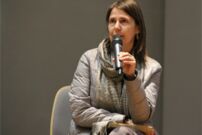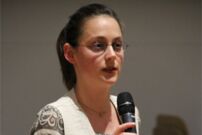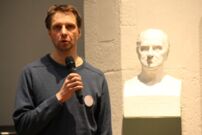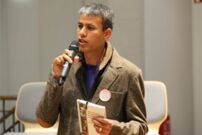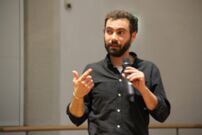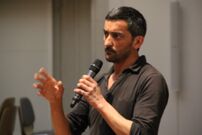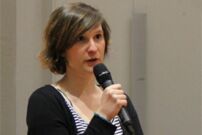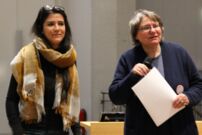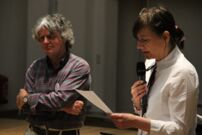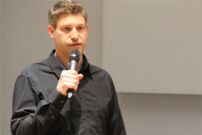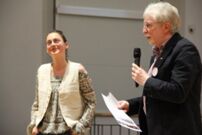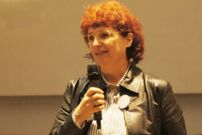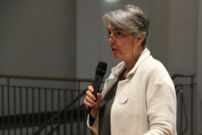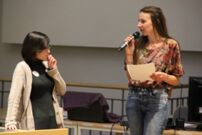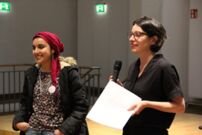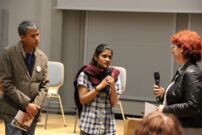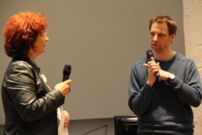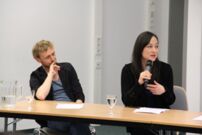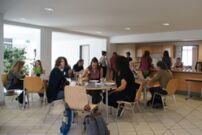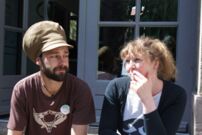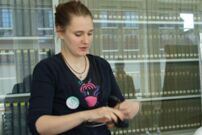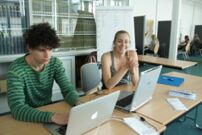Report on the 13th Göttingen International Ethnographic Film Festival
May 4th - May 8th, 2016
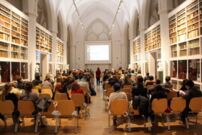
The festival is organised by an association, founded in May 2007.
The festival takes place in the heart of Göttingen.
The festival is founding member of CAFFE - Coordinating Anthropological Film Festivals in Europe.
The Festival Programme, was composed by an international selection committee, including former and new members. More than 533 media had been submitted. 56 films were selected, 23 for the student category, 33 for the main festival.
@Göttingen: GöttingenInternationalEthnograficFilmFestival_Trailer 2016 from Michael Schlorke on Vimeo.
As every year, the student film competition was of special interest and many commented on the very good quality of the films. Beside the presentation of new productions the festival had various main topics: "Economic Struggles and Migration", "Coping with Change", "Consequences of Mining", "Cultural Heritage and Film" and "Women' Perspectives".
During the festival a panel discussion on "Consequences of Mining", a roundtable about "Filming (Intangible) Cultural Heritage" and a roundtable about "Researching Through the Visual" were taking place.
A new partnership: Koblenz
GIEFF established a new partnership with various institutions in Koblenz.
During two days part of the GIEFF programm was also screened there.
GIEFF@Koblenz 2016 from GIEFF on Vimeo.
More information.
The Student Award was sponsered by Litfin-Stiftung
An international jury was invited to decide on the student award winner.
The jury decided to split the student award between three films, two being part of an anthropological research project and thesis, one being part of a non-degree related research.
Student Award Winners 2016
Adfditionally the jury awarded two special mentions.
Special Mentions 2016
Discussing Films, Discussing Filmmaking and Exchanging Ideas
Films from everywhere
56 films from filmmakers of 34 different nationalities telling stories about people in 44 countries were presented.
Over 210 permanent guests from 18 countries, from all over Europe, but also from Australia, Egypt, India, Japan, Nepal, and USA visited the festival.
A Changing World: New and Old Topics
Economic Struggles and Migration is a topic which seems to touch us all and to affect us all. The topic was discussed in 15 films but it was touched in others also.
Coping with Change might be the reason for migration but also people staying at home are affected by it.
Consequences of Mining was a new topic coming in. Mining was discussed in various films in quite different ways. In a panel discussion the problem was discussed more deeply.
Cultural Heritage and Film is an old and a new topic. Specially in the context of intangible heritage film is mentioned very often. The topic was discussed in 11 films. In a roundtable the filmmakers present discussed the problems of making film on (intangible) cultura heritage.
Women's Perspectives refer to the women portraited in the films and the perpectives of the female filmmakers. 12 films discussed the fate of women and nearly half of the films were made by female filmmakers.
Lively discussions
33 Filmmakers from all over the world presented their work at the festival.
After each film there was some time for questions and answers.
Young vistors, filmmakers and experts were questioning the filmmaking and the content of the films.
Thanks to the moderators
We want to thank all the moderators who saw to an animated exchange of ideas with their expertise.
Panels and Roundtables
This year we had planed to organise twoe Roundtables to discuss certain topics more intesntively. Additionally, a panel was organised as the topic of "consequences of mining" was treated in various films.
Panel "Consequences of Mining"
During the film selection suddently a new topic arose: In which way does mining influence the live of the miners and the people living there.
Five of the selected films offer insights in minig areas in Bolivia, Kyrgyzstan, India, Nepal and Chile. They treat silver and gold mining, copper and coal minging as well as the extraction of copper.
Roundtable I "Filming (Intangible) Cultural Heritage"
Various films in the festival investigate cases of intangible cultural heritage in quite different ways. It seems to be obvious that film is an adequate medium to document the vanishing intangible heritage. The invited filmmakers come from different countries with different cultural backgrounds and their films present quite diverse cases. Anyway all are struggling with question of how to document, discuss, represent cultural heritage.
Thus various questions arise which we would like to discuss with the filmmakers present.
- - What was the motivation to make the film?
- - What did the filmmaking mean to the protagonists, what was their interest?
- - In which way does film contribute to the safeguarding of the cultural heritage?
- - What does a filmmaker has to consider when making a film in the context of intangible cultural heritage.
Roundtable II "Researching Through the Visual"
The roundtable, moderated by Andreas Ackermann, refers to the growing desire to explore under-investigated modes of experience, commonly referred to as “sensory turn”, having an on-going impact on contemporary scholarship in the humanities and social sciences. Especially anthropologists producing non-text based ethnographies such as film, sound recordings and phonography, museum exhibits, animations, drawings, narrative documentaries, design works or interactive events, increasingly engage with “sensuous scholarship” (Stoller) acknowledging their own embodied, reflexive or intuitive situatedness and/or cautiously consider the “visualism” of Western thought. Against this background, the participants are going to discuss various ways in which sensory approaches to non-text based ethnographies and storytelling practices could be productively combined.
Talking about, looking at, relaxing from films
In the video library visitors were able to view films which they missed or which haven't been selected. During the whole festivals the viewing places were occupied.
In the cafeteria visitors and filmmakers could meat, chat and discuss. The students also interviewed several filmmakers as part of their university excursion.
These excursions met also in- and outside to discuss the films together or to have a meeting with one of the guests.
Finally, the visitors relaxed outside, in the little garden or on the steps of the Paulinerkiche.
Many Thanks to the Festival Staff
Without the help of many young students it would not be possible to organise the festival.
Special thanks to:
- the festival assistent and catalogue editor
- the technical team
- the interns
- the student helpers
Travelling GIEFF
Since several years our festival films are travelling through out Germany and the world, very often they are shown at conferences or in seminars at the university, sometimes also at local cultural events.
If you are interested to organise a Travelling GIEFF please let us know: event@gieff.de
Besides the parallel screening of some films at Koblenz, there have been screenings of some films in ethnographic film events in
